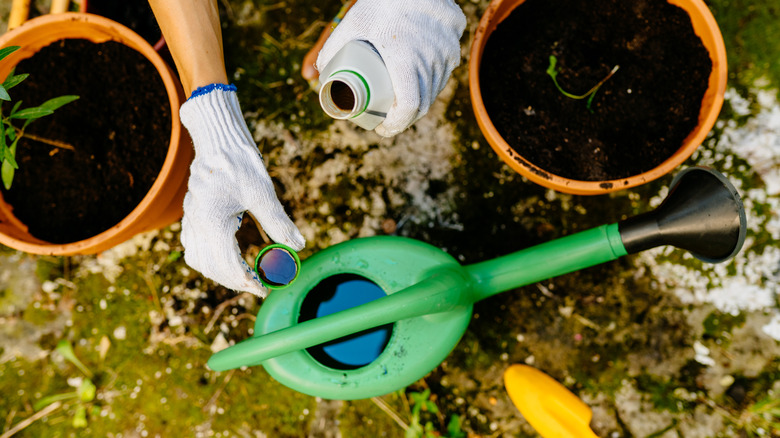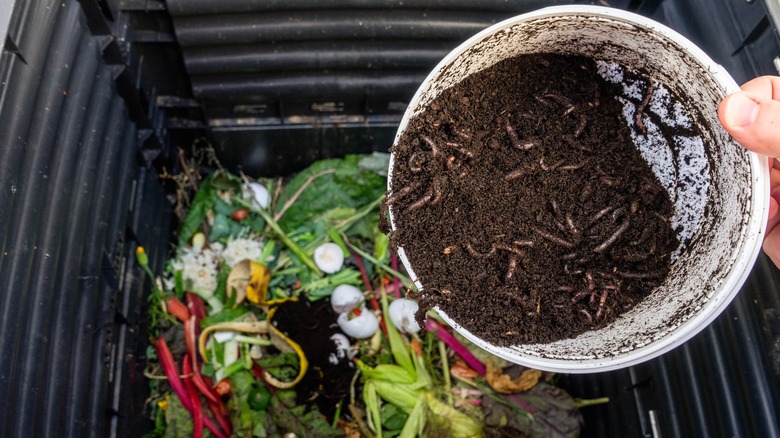Composting is a great way to enhance your garden, improve your soil, and elevate your plants’ health, all while reducing your garbage output by up to 25%. It’s not even hard to do. Lawn clippings, hay, plant-based table scraps, coffee grounds, egg shells, and tea bags can all be added to a compost pile and kept moist in a shady spot, where it will decompose into rich, nutritious, fertile material. Of course, this process can take up to two years if you have a big enough pile, so to speed up the job, consider adding some hydrogen peroxide to the mix and watch your compost mature much more quickly.
Composting works through a system of heat and moisture. As the organic materials are kept moist, certain microorganisms feed on them, thus heating up the center of the pile, which sustains new microorganisms. Sufficient aeration is also required to keep things moving. Having the right balance of these factors makes for a successful compost pile, and it just so happens, that when hydrogen peroxide joins the party, its decomposition produces both heat and oxygen. It seems like an amazing pairing. But, is it?
Adding hydrogen peroxide to compost

In 2001, Acta Horticulturae published a scientific paper on the “Triggering Effect of Hydrogen Peroxide on Composting,” saying the addition of hydrogen peroxide to a compost pile rapidly increased the internal temperature, far outpacing the control pile. The reasoning behind this is very simple science.
Hydrogen peroxide is just water with an extra oxygen molecule, and in normal, everyday conditions it’s already decomposing at an incredibly slow pace. However, if you add heat or sunlight to hydrogen peroxide, the decomposition speeds up. Hence the dark plastic bottles that should be stored in cool, dry places. The compost pile, however, is neither cool, nor dry, and parts of it are exposed to sunlight. When hydrogen peroxide is added to this environment, it breaks down into water, oxygen, and heat, maintaining the moisture and aeration of the pile and adding to the heat, which further accelerates the peroxide decomposition, resulting in more heat. This cyclical effect acts upon the microorganisms and the composting organic materials exponentially to give a huge boost to your composting efforts.
Compost accelerators are not a new phenomenon, and that’s essentially what this hydrogen peroxide hack is. Unfortunately, the study didn’t specify how much to use, but when using it as a fertilizer, the desired ratio is 1 teaspoon for every cup of water, or ⅓ cup for every gallon. When adding water to your compost, simply add a small amount of 3% hydrogen peroxide solution too.
Questionable evidence

Not all home composters are convinced this hydrogen peroxide hack will work as advertised. Across the internet in gardening forums, posters try to determine the veracity of the claim. Can hydrogen peroxide work as a compost accelerator? Our gardening experts think not. Doing her own independent research, House Digest’s horticulturalist and sustainable gardening expert Amira Gundel said she couldn’t find independent sources outside of the one Acta Horticulturae study that supported the idea of adding hydrogen peroxide to compost. She said, “It does not seem like a good idea. [Hydrogen peroxide] kills fungus and bacteria that is vital for a healthy compost pile.” She explained that “good compost has good bacteria, and since peroxide is a fungicide, and fungus is crucial for breaking down compost… I would not recommend it.”
House Digest’s master gardener Tiffany Selvey echoed this sentiment. “Hydrogen peroxide kills bacteria, and since compost is developed by encouraging bacteria and fungi, as well as worms, pill bugs, etc. I cannot fathom how this could possibly be a good idea,” she said. Upon reading the study in question, Selvey understood the science but cautioned, “The materials mentioned in the abstract are not things a typical gardener would be composting, so it sounds like this might be for large-scale composters.” If you’re still intrigued by the possibilities and want to try this method, it might be a good idea to work with a smaller, separate compost pile as a test before applying the solution to your primary pile.



